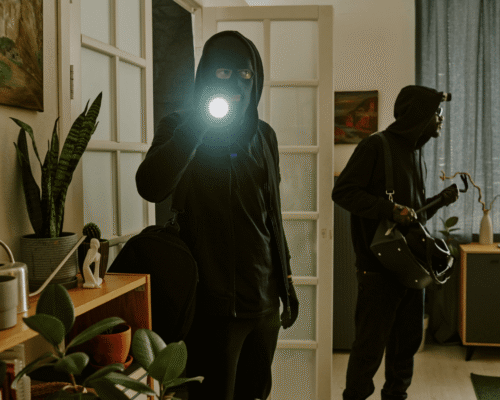Are You Facing Conspiracy Charges for Theft or Robbery in San Diego? Here’s What to Know.

Conspiracy laws in California allow prosecutors to pursue criminal charges, even if the alleged crime was never actually committed. If you are accused of being part of a theft ring or a robbery operation in San Diego, you could be looking at serious jail time.
Criminal Conspiracy & California Law
California Penal Code 182 defines criminal conspiracy as an agreement between two or more people to commit a crime. It must be accompanied by at least one overt act in furtherance of that agreement. The crime of conspiracy is considered complete once the agreement and act occur, even if the planned crime never even happens.
In the context of property crimes, this means a person can be charged not just for theft or robbery, but for planning or assisting in the crime. Conspiracy charges may be filed in cases related to:
- Theft rings involving stolen goods or organized retail theft
- Home invasion robberies with multiple suspects
- Planned burglaries where tools or roles are divided among participants
- Auto theft operations
- Fraud-based property schemes
What Counts as an “Overt Act”?
An overt act is any step taken to move the criminal plan forward. It does not have to be illegal in itself. Examples include:
- Purchasing tools to break into a building
- Scouting a location
- Communicating details of a plan via text or email
- Driving a co-conspirator to the target location
The key point is that prosecutors only need to show one overt act to support the conspiracy charge, even if the act was unsuccessful.
How Does Conspiracy Apply to Theft or Robbery?
Theft
If a group of people plan to steal property and one person carries out any step toward the theft, all parties may be charged under criminal conspiracy statutes in California. This is true whether that conspiracy involves removing items from a store, business, or private residence. Even someone who did not directly commit the theft can face the same penalties as others involved in the alleged crime.
Robbery
Robbery is defined as taking property by force or fear, and it is classified as a violent crime. If a group of individuals is accused of planning a robbery together, they can be charged with conspiracy to commit robbery, a serious felony under California law. In many cases, the penalties for conspiracy to commit robbery match those of the completed offense.
How Prosecutors Prove Conspiracy Charges
To convict a suspect of conspiracy theft charges in California, the prosecution must demonstrate the following elements:
- An Agreement: There was a clear understanding between two or more people to commit a crime.
- Intent: Each person intended that the crime be committed.
- Overt Act: At least one of the individuals took a concrete step to further the plan.
The agreement does not need to be formal or written; it can be implied by actions, communications, or shared planning. Text messages or social media posts can be used as evidence of a conspiracy.
Penalties for Criminal Conspiracy in San Diego
The penalties for conspiracy under California Penal Code 182 depend on the severity of the crime being planned. Conspiracy charges are prosecuted aggressively in San Diego, especially when tied to organized groups or violent property crimes.
Penalties for Conspiracy to Commit a Misdemeanor
Conspiracy to commit a misdemeanor is typically charged as a misdemeanor. Possible penalties include up to 1 year in county jail and fines up to $1,000.
Penalties for Conspiracy to Commit a Felony
Conspiracy to commit a felony, such as robbery or grand theft, carries the same penalties as the underlying felony.
For example, conspiracy to commit robbery could result in:
- 3 to 9 years in prison
- A strike under California’s Three Strikes Law
- Fines, restitution, and loss of gun rights
Aggravating factors, such as gang involvement, use of weapons, or prior convictions, can significantly increase these penalties.
Effective Legal Defense Strategies
Lack of Agreement
A successful defense may involve demonstrating that no agreement ever existed. For example, merely being present at the scene or associating with individuals who commit a crime is not enough to prove conspiracy.
Withdrawal From the Conspiracy
If a defendant clearly withdrew from the conspiracy before the overt act occurred, this may serve as a defense. However, withdrawal must be communicated effectively to co-conspirators and be followed by an attempt to stop the crime (e.g., warning authorities).
No Overt Act
If the prosecution cannot prove that an overt act was taken in furtherance of the plan, the charge cannot stand under Penal Code 182.
False Accusations or Misidentification
Sometimes people are wrongly accused due to mistaken identity or because another party named them in exchange for leniency. A thorough investigation of communications, location data, and witness statements can be used to challenge the accusation.
Entrapment
If law enforcement induced the defendant to join or commit a conspiracy they would not have otherwise participated in, entrapment may be a valid defense.
The Role of an Experienced Criminal Defense Lawyer in Conspiracy Cases
Conspiracy charges are often built on circumstantial evidence, such as digital communications, call logs, or surveillance footage. Prosecutors may try to use minor actions as proof of participation in a larger plan.
An experienced San Diego theft defense attorney can:
- Analyze the prosecution’s timeline and evidence for weaknesses
- File motions to suppress unlawfully obtained evidence
- Cross-examine co-defendants or informants
- Demonstrate lack of intent or no connection to the alleged conspiracy
- Negotiate for reduced charges or alternative sentencing
Reasons to Choose Us
At jD Law Criminal Defense Attorneys, Attorney James N. Dicks has handled thousands of criminal cases over a career that spans more than 30 years. He is a Certified Criminal Law Specialist by the California Board of Legal Specialization. His investigative background as a former LAPD investigator gives him a unique edge in identifying flaws in the prosecution’s case. James N. Dicks has received the Avvo Client Choice Award seven times.
Speak With an Experienced Criminal Defense Attorney in San Deigo
At jD Law Criminal Defense Attorneys, we understand the pressure you are under, and the legal tactics prosecutors apply in these cases. Call our office today at (760) 630-2000 for a free consultation with a San Diego criminal defense lawyer.
We will fight to protect your future.
Don’t Waste Any Time!
Call us today for a FREE Consultation
(760) 630-2000

- Criminal Law Expert - Led by a Board Certified Criminal Law Specialist. Read More About Board Certification
- 100s of Cases Tried - Since 1990, James Dicks has represented hundreds of clients. Read Bio
- Client Approved - Read our online testimonials from satisfied jD Law Criminal Defense Attorneys Clients. Yelp Reviews
- November 16, 2025
San Diego Burglary Defense: Different Charges for … - November 14, 2025
What Happens If San Diego Police Keep Questioning … - November 4, 2025
Receiving Stolen Property in San Diego: Defenses …





